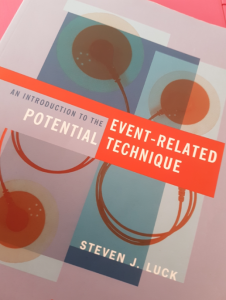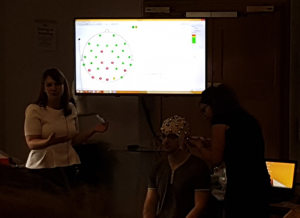Last week I attended a 5-day ERP Boot Camp at the University of Birmingham, and this was an incredible opportunity for me to learn from ERP experts and get specific advice for running my next ERP experiments. The workshop was led by two of the most renowned ERP researchers in the world, namely Professor Steven Luck and Dr Emily Kappenman. Luck and Kappenman are both part of the Centre for Mind and Brain at the University of California, Davis, which is one of the world’s leading centres for research into cognitive neuroscience. They are both among the set of researchers who set the publication guidelines and recommendations for conducting EEG research (Keil et al. 2014), and Luck is also the developer of ERPLAB, which is a MATLAB Toolbox designed specifically for ERP data analysis. Moreover, Luck is the author of the authoritative book entitled An Introduction to the Event-Related Potential Technique. Before attending the ERP Boot Camp, most of the knowledge that I had about ERPs came from this book. Therefore, I am extremely grateful that I have had this opportunity to learn from the authorities in the field, especially since Luck and Kappenman bring the ERP Boot Camp to the University of Birmingham just once every three years.
guidelines and recommendations for conducting EEG research (Keil et al. 2014), and Luck is also the developer of ERPLAB, which is a MATLAB Toolbox designed specifically for ERP data analysis. Moreover, Luck is the author of the authoritative book entitled An Introduction to the Event-Related Potential Technique. Before attending the ERP Boot Camp, most of the knowledge that I had about ERPs came from this book. Therefore, I am extremely grateful that I have had this opportunity to learn from the authorities in the field, especially since Luck and Kappenman bring the ERP Boot Camp to the University of Birmingham just once every three years.
There were two parts to the ERP Boot Camp: 2.5 days of lectures covering the theoretical aspects of ERP research (led by Steven Luck), and 2.5 days of practical workshops which involved demonstrations of the main data acquisition and analysis steps, followed by independent data analysis work using ERPLAB (led by Emily Kappenman). Day 1 of the Boot Camp provided an overview of different experimental paradigms and different ERP components, which are defined as voltage changes that reflect a particular neural or psychological process (e.g. the N400 component reflects the processing of meaning and the P600 component reflects the processing of structure). Most of the electrical activity in the brain that can be detected by scalp electrodes comes from the surface of the cortex but, in the lecture on ERP components, I was amazed to find out that there are some ERP components that actually reflect brain stem activity. These components are known as auditory brainstem responses. I also learnt about how individual differences between participants are typically the result of differences in cortical folding and differences in skull thickness, rather than reflecting any functional differences, and I learnt how ERP components from one domain such as language can be used to illuminate psychological processes in other domains such as memory. From this first day at the Boot Camp, I started to gain a much deeper conceptual understanding of the theoretical basis of ERP research, causing me to think of questions that hadn’t even occurred to me before.
Day 2 of the Boot Camp covered the principles of electricity and magnetism, the practical steps involved in processing an EEG dataset, and the most effective ways of circumventing and minimizing the problems that are inevitably faced by all ERP researchers. On this day I also learnt the importance of taking ERP measurements from difference waves rather than from the raw ERP waveforms. This is invaluable knowledge to have when analysing the data from my next experiments. In addition, I gained some concrete advice on stimulus presentation which I will take into account when editing my stimuli.
On day 3 of the Boot Camp, we were shown examples of ‘bad’ experimental designs and we were asked to identify the factors that made them problematic. Similarly, we discussed how to identify problematic results just by looking at the waveforms. These was really useful exercises in helping me to critically evaluate ERP studies, which will be useful both when reading published articles and when thinking about my own experimental design.
From the outset of the Boot Camp, we were encouraged to ask questions at any time, and this was particularly useful when it came to the practical sessions as we were able to use our own data and ask specific questions relating to our own experiments. I came prepared with questions that I had wanted to know the answers to for a long time, as well as additional questions that I had thought of throughout the Boot Camp, and I was given clear answers to every one of these questions.
this was particularly useful when it came to the practical sessions as we were able to use our own data and ask specific questions relating to our own experiments. I came prepared with questions that I had wanted to know the answers to for a long time, as well as additional questions that I had thought of throughout the Boot Camp, and I was given clear answers to every one of these questions.
Furthermore, as well as acquiring both theoretical and practical knowledge from the scheduled lectures and workshops, I also gained a lot from talking to the other ERP researchers who were attending the Boot Camp. A large proportion of attendees focused on language as their main research area, while others focused on clinical psychology or other areas of psychology such as memory or perception. I found it really interesting to hear the differences of opinion between those who were primarily linguists and those who were primarily psychologists. For instance, when discussing the word-by-word presentation of sentences in ERP experiments, the psychologists stated that each word should immediately replace the previous word, whereas the linguists concluded that it is best to present a blank white screen between each word. Conversations such as this made it very apparent that many of the aspects of ERP research are not standardised, and so it is up to the researcher to decide what is best for their experiment based on what is known about ERPs and what is conventional in their particular area of research.
Attending this ERP Boot Camp was a fantastic opportunity to learn from some of the best ERP researchers in the world. I now have a much more thorough understanding of the theoretical basis of ERP research, and I have an extensive list of practical suggestions that I can apply to my next experiments. I thoroughly enjoyed every aspect of the workshop and I am very grateful to CASS for funding the trip.
